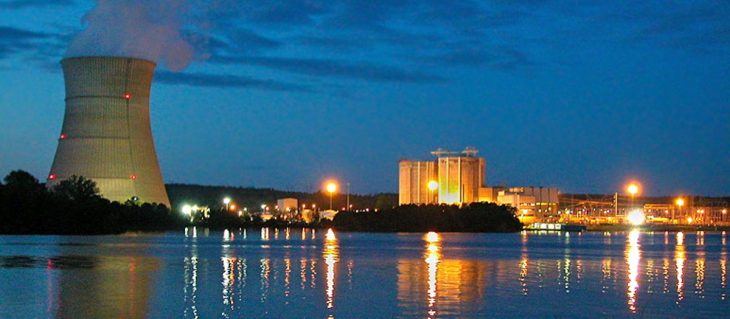Energy In-depth: Entergy Nuclear adds to its executive bench
by July 1, 2016 6:55 am 213 views

Entergy's Arkansas Nuclear One power plant in Russellville, Ark. (photo from Entergy)
Editor’s note: Each Friday, Talk Business & Politics provides “Energy In-depth,” a round-up of energy and regulatory news.
–––––––––––––––––
ENTERGY NUCLEAR ADDS TO ITS EXECUTIVE BENCH
Entergy Chief Nuclear Officer Chris Bakken has announced that Larry Coyle, Indian Point Energy Center site vice president, has been named chief operating officer to work alongside COOs Donna Jacobs and John Ventosa. The three executives will be responsible for the strategic direction, support and oversight of the Entergy’s national fleet of 11 reactors in nine locations, including Arkansas Nuclear One and Two in Russellville.
In other facility moves, Tony Vitale, currently site vice president for Palisades Power Plant in Michigan, was named site vice president for Indian Point Energy Center in New York, and Charlie Arnone, interim vice president of operations support, was named site vice president for Palisades. Coyle, Vitale and Arnone begin their new roles in August.
Entergy, which named Bakken as its new chief nuclear officer in February, owns and operates power plants with approximately 30,000 megawatts of electric generating capacity, including nearly 10,000 megawatts of nuclear power.
WIDER PANAMA CANAL WILL BOOST LNG TRADE, EIA SAYS
The newly expanded Panama Canal will be able to accommodate 90% of the world’s current liquefied natural gas (LNG) tankers with LNG-carrying capacity up to 3.9 billion cubic feet (Bcf). Prior to the expansion, only 30 of the smallest LNG tankers (6% of the current global fleet) with capacities up to 0.7 Bcf could transit the canal.
The expansion has significant implications for LNG trade, reducing travel time and transportation costs for LNG shipments from the U.S. Gulf Coast to key markets in Asia and providing additional access to previously regionalized LNG markets, the EIA said.
The new locks in the canal provide access to a wider lane for vessels and are 180 feet across, compared with 109 feet in the original locks. Only the 45 largest LNG vessels will not be able to use the expanded canal. Transit through the Panama Canal will considerably reduce voyage time for LNG from the U.S Gulf Coast to markets in northern Asia. Four countries in northern Asia—Japan, South Korea, China, and Taiwan collectively account for almost two-thirds of global LNG imports.
A transit from the U.S. Gulf Coast through the Panama Canal to Japan will reduce voyage time to 20 days, compared to 34 days for voyages around the southern tip of Africa or 31 days if transiting through the Suez Canal. Voyage time to South Korea, China, and Taiwan will also be reduced by transiting through the Panama Canal.
SEC CHARGES ‘FRACK MASTER’ FOR RUNNING $80 MILLION OIL AND GAS SCHEME
The Securities and Exchange Commission has charged Chris Faulkner – the CEO of Breitling Energy Corp. and recurring guest on CNBC, CNN International, Fox Business News, and the BBC to discuss oil-and-gas topics – with disseminating false and misleading offering materials, misappropriating millions of dollars of investor funds and attempting to manipulate his company’s stock.
Faulkner, who calls himself the “Frack Master” for his purported expertise in hydraulic fracturing, allegedly orchestrated an $80 million oil and gas fraud ring by offering and selling “turnkey” oil and gas working interests. The SEC also charged four companies and eight individuals for their roles in the scheme, and suspended trading in BECC’s securities for 10 business days.
According to the SEC’s complaint, Faulkner ran most of Breitling’s operations, while co-owners Parker Hallam and Michael Miller oversaw the sales process. The SEC alleged that BEEC’s offering materials contained false statements and omissions about Faulkner’s experience, estimates for drilling costs, and how investor funds would be used. They claim Faulkner misappropriated at least $30 million of investor funds for personal expenses, including lavish meals and entertainment, international travel, cars, jewelry, gentlemen’s clubs, and personal escorts.
